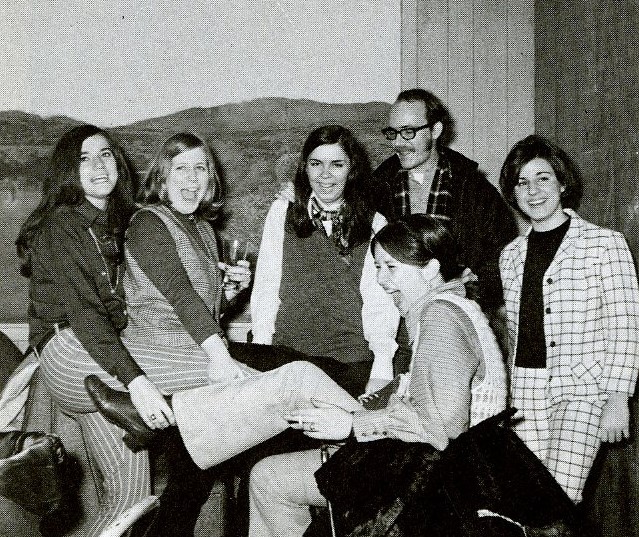
College campuses are complex organisms. They are made up of students, staff, faculty, halls, arenas, and libraries. The college experience is comprised of classes, organizations, student jobs, and groups of friends. For many students, the bars, clubs, and restaurants play a large part in not only their college experiences, but also of the college environment at large. Socialization is an integral part of college and one of the major factors that perspective students consider when choosing an institution. This was just as true for the students attending Mundelein College as it was for any student at any other university. While conducting interviews for the Share Your Story: Student Life at Mundelein Oral History Project, Mundelein alumnae often reflected on their experiences in these public social spaces as some of the most memorable. Local bars and restaurants like Hamilton’s and The Red Garter, while gone, live on in the memories that were made there. Mundelein yearbooks are filled with joyful pictures of these locales and the events and parties that went on there. From “Ladies” Night” to the “100 Days Party,” Mundelein students understood the importance of balancing academics with social activities. In remembering Mundelein College, we must accept a truth that where college students attend classes, they also attend parties, bars, and clubs.
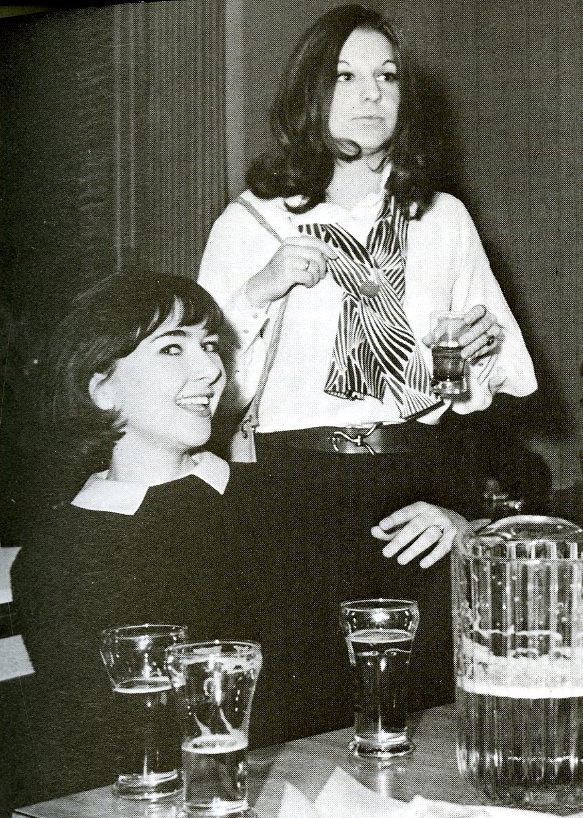
When researching the social activities of Mundelein students, one name comes up almost immediately: Hamilton’s Bar & Grill. In an interview with Women and Leadership Archives graduate assistant Scarlett Andes, Marguerite Phillips Britton, a graduate of the class of 1959, reflected on her experience with the bar: “Hamilton’s was a bar on Broadway. It was the college hangout at that time, for Loyola and for Mundelein, although we weren’t supposed to be there” [1]. Hamilton’s Bar & Grill opened in 1933, only three years after Mundelein College, and operated until its closure in 2012 [2]. By the 1970s, Hamilton’s, or simply “Hammy’s,” was so engrained into the culture of Mundelein College that they helped sponsor the Mundelein Yearbook and hosted an event called the “100 Days Party.” During this event, seniors gathered to one hundred days prior to graduation to celebrate their time at Mundelein. The 1970 Yearbook remembered the event: “February 26, 1970 found the seniors at Hamilton’s, drinking beer and singing ‘Celebrate.’ It was only 100 days till Graduation. The end was suddenly in sight, and the countdown began with jubilation and, perhaps, a tinge of regret” [3].
While Hamilton’s hosted this celebration, it also served as a regular social space for both Mundelein and Loyola students on a more regular basis. In an interview with WLA graduate assistant Melissa Newman, Karen Szymanski of the class of 1971 reflected on her experiences at Hamilton’s as an underage undergraduate. “I remember we would head down to Hamilton’s every now and again for burgers. And yeah, that was fun. And they let us into a back room because most of us were underage. But as long as we were drinking like Coke along with the burgers, then it was okay” [4].
Sadly, Hamilton’s closed on October 27, 2012, following almost eighty years of serving Mundelein and Loyola students alike. The space remained a restaurant, eventually becoming Bar Sixty-Three Pub & Pizza before it closed in 2018 [5].
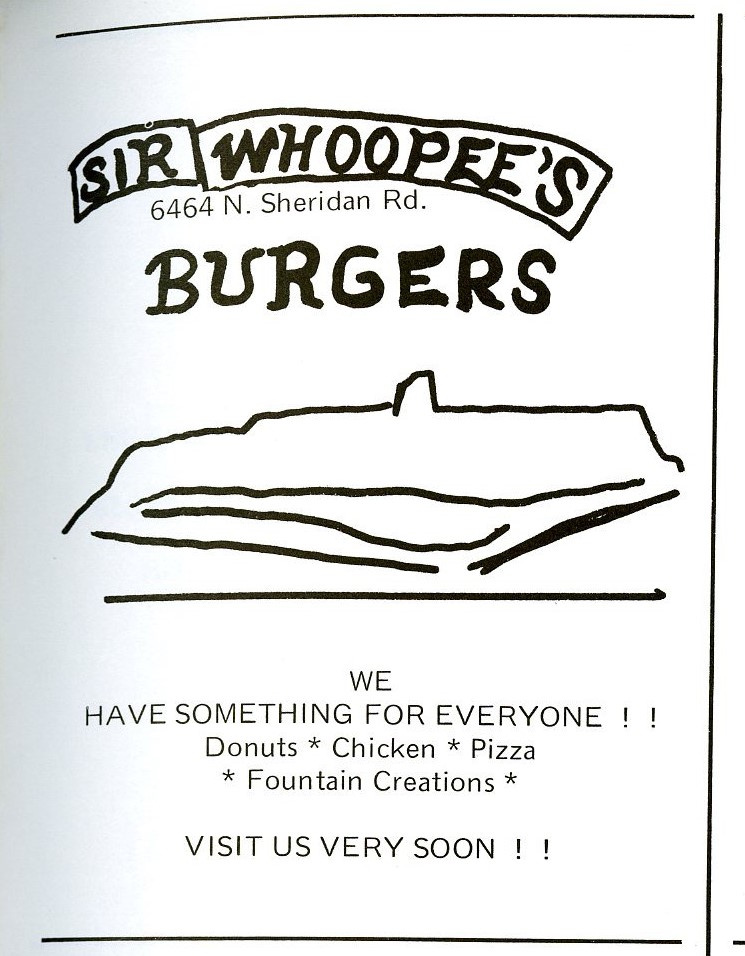
Hamilton’s was not the only place underage Mundelein students could go to socialize and grab a meal. Sir Whoopee’s Burgers was located on Sheridan Road in what is now a Potbelly’s next to the Lake Shore Campus. Karen Szymanski remembers Sir Whoopee’s “was a sandwich place, and it had this big, like a knight, very fat looking knight on a horse that would go back and forth, and the sign would say, ‘Sir who? Sir Whoopees!’”[6]. Sir Whoopee’s opened in 1968 and quickly became a frequent spot for Mundelein students to grab a burger and a soda. In an interview with graduate assistant Chris Mattix, Katy Hogan, class of 1972, recalled working at Sir Whoopee’s, “it was a really greasy place. When I’d come back from work—and we worked there until two in the morning. It was rough. You’d just have to strip down and leave those clothes over there somewhere so they wouldn’t infect anything [7].” Eventually, Sir Whoopee’s was sold, and the space was converted into a Denny’s before its current iteration as a sandwich shop [8].
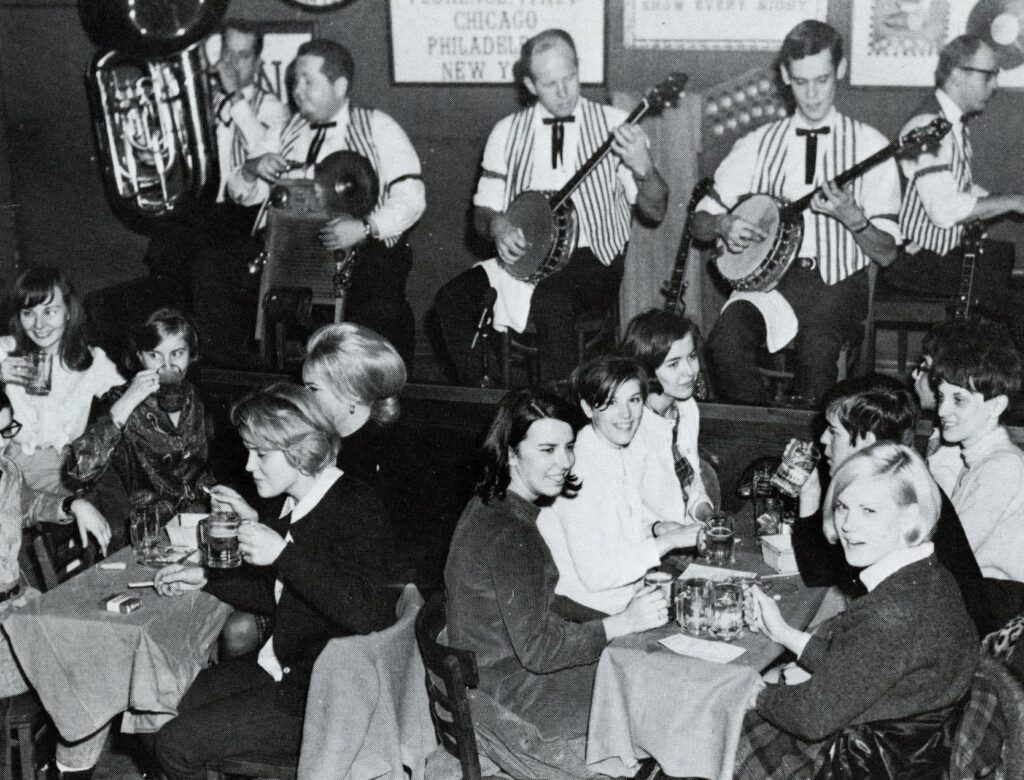
Another regular haunt for Mundelein and Loyola students was the Red Garter Banjo Club located next to the Loyola School of Law on the Water Tower Campus. The Red Garter was opened in 1964 in Chicago by Chuck Hillstrom, who opened other Red Garter chain restaurants inspired by the San Francisco original [9]. The club featured a regular band and drew students in with several weekly specials. In an interview with WLA Sesquicentennial Scholar Regina Hong, Mary Frances Consola, a 1968 Mundelein graduate, remembered going to the Red Garter “to listen to the banjo. The Red Garter had Ladies’ Night on Tuesday nights so every Tuesday night, there would be a contingent of Mundelein students, mostly seniors, at the Red Garter to listen to the banjo music” [10].
In addition to “Ladies’ Night,” the Red Garter also featured a Monday 10 cent beer special. The 1970 yearbook dubbed this special “The Legend of the 10₵ Beer” recalling that “the first Monday of the month- any month- found the seniors at the Red Garter (other nights they were at Hamilton’s or the Joker). Beer was cheap. Songs were loud. Laughs were free. The faculty came too, and no one had a voice for Tuesday classes” [11].
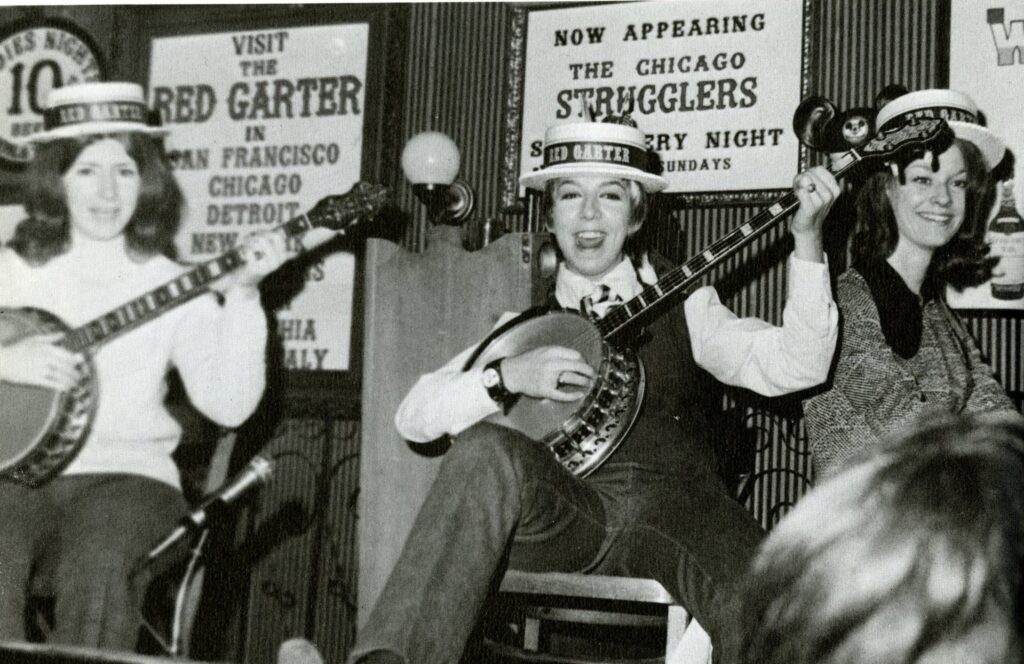
Bars, clubs, and restaurants like Hamilton’s, Sir Whoopee’s, and the Red Garter become cornerstones of the memories that alumnae hold when recalling their experiences. These spaces allowed them to socialize with friends, bond with faculty, work part-time jobs, and meet future partners. While these three social spots are closed now, they live on in the memories of those who spent Tuesdays at the Red Garter for Ladies’ Night, who celebrated a forthcoming graduation at Hamilton’s, or who worked late, greasy nights at Sir Whoopee’s. While most current Loyola students have never heard of the banjo club frequented by those who came before them, the times spent in these spaces are encapsulated in yearbook photos and articles in The Skyscraper student newspaper. For those who attended Mundelein College, particularly during the late 1960s and early 1970s, these spaces shaped their memories of their college experience and remembering these places is an important part of their stories.

Chris is a graduate assistant at the WLA and is in their second year in the Public History MA program at Loyola. Chris’ focus is on Queer history in America and Germany in the pre-Stonewall era. Chris is currently a graduate assistant at the Leather Archives and Museum in Chicago, IL. In their free time, Chris is a baker, drag queen, and dog parent.
[1] Britton, Marguerite Phillips, Interview with Scarlett Andes, July 15, 2020, via Zoom, transcript, Women and Leadership Archives, Chicago, IL, available online at http://libapps.luc.edu/digitalexhibits/s/voices-from-mundelein/item/3207.
[2] Bendersky, Ari. “Loyola Fave Hamilton’s Bar Closing after Nearly 80 Years.” Eater Chicago, October 12, 2012. https://chicago.eater.com/2012/10/12/6535717/loyola-fave-hamiltons-bar-closing-after-nearly-80-years.
[3] Mundelein College, Yearbook 1970 (Chicago, IL: 1970), 46, Women and Leadership Archives, https://luc.access.preservica.com/uncategorized/IO_5bc50806-adbe-4198-a627-b4515b45b620/.
[4] Szymanski, Karen, Interview with Melissa Newman, November 29, 2021, via Zoom, transcript, Women and Leadership Archives, Chicago, IL, unpublished.
[5] Bendersky, Ari. “Loyola Fave Hamilton’s Bar Closing after Nearly 80 Years.” Eater Chicago, October 12, 2012. https://chicago.eater.com/2012/10/12/6535717/loyola-fave-hamiltons-bar-closing-after-nearly-80-years.
[6] Szymanski, Karen, Interview with Melissa Newman, November 29, 2021, via Zoom, transcript, Women and Leadership Archives, Chicago, IL, unpublished.
[7] Hogan, Katy, Interview with Chris Mattix, July 26, 2022, via Zoom, recording, Women and Leadership Archives, Chicago, IL, unpublished.
[8] Holton, John. “Everything Old is New Again.” The Sound of One Hand Typing, October 3, 2020. https://thesoundofonehandtyping.com/2020/10/03/everything-old-is-new-old-again-socs/
[9] Cartwright, Phil. “Red Garter.” Phil’s Jazz Bands, https://www.philcartwright.info/RedGarter.html
[10] Consola, Mary Frances, Interview with Regina Hong, Session Two, July 15, 2020, via Zoom, transcript, Women and Leadership Archives, Chicago, IL, available online at http://libapps.luc.edu/digitalexhibits/s/voices-from-mundelein/item/3208.
[11] Mundelein College, Yearbook 1970 (Chicago, IL: 1970), 12, Women and Leadership Archives, https://luc.access.preservica.com/uncategorized/IO_c1fc398e-a61d-4fba-be56-c411bf48f4d7/.
Images:
Figure 1. Mundelein College, Yearbook 1970 (Chicago, IL: 1970), 46, Women and Leadership Archives, https://luc.access.preservica.com/uncategorized/IO_5bc50806-adbe-4198-a627-b4515b45b620/.
Figure 2. Mundelein College, Yearbook 1970 (Chicago, IL: 1970), 46, Women and Leadership Archives, https://luc.access.preservica.com/uncategorized/IO_5bc50806-adbe-4198-a627-b4515b45b620/.
Figure 3. Mundelein College, Yearbook 1970 (Chicago, IL: 1970), 48, Women and Leadership Archives https://luc.access.preservica.com/uncategorized/IO_b623432b-18dc-41e9-a113-42e2d22f8cb6/
Figure 4. Mundelein College, Yearbook 1968 (Chicago, IL: 1968), Women and Leadership Archives https://luc.access.preservica.com/uncategorized/IO_5102fe59-f31f-4b3d-8350-8c16c0d15ee0/
Figure 5. Mundelein College, Yearbook 1971 (Chicago, IL: 1971), 22, Women and Leadership Archives http://libapps.luc.edu/digitalexhibits/s/150-student-life-timeline/media/2732
Loyola University Chicago’s Women and Leadership Archives Blog is designed to provide a positive environment for the Loyola community to discuss important issues and ideas. Differences of opinion are encouraged. We invite comments in response to posts and ask that you write in a civil and respectful manner. All comments will be screened for tone and content and must include the first and last name of the author and a valid email address. The appearance of comments on the blog does not imply the University’s endorsement or acceptance of views expressed. Questions? Please contact the WLA at wlarchives@LUC.edu.
